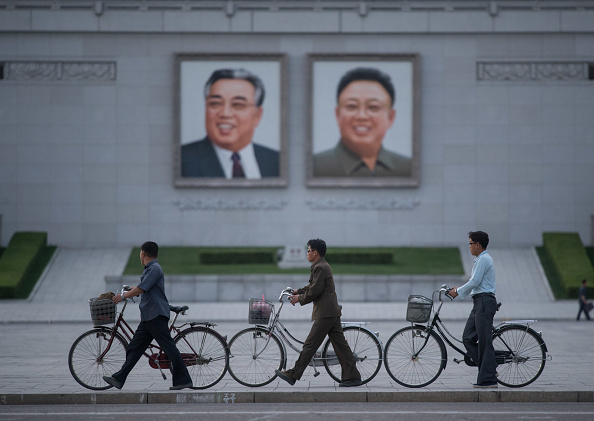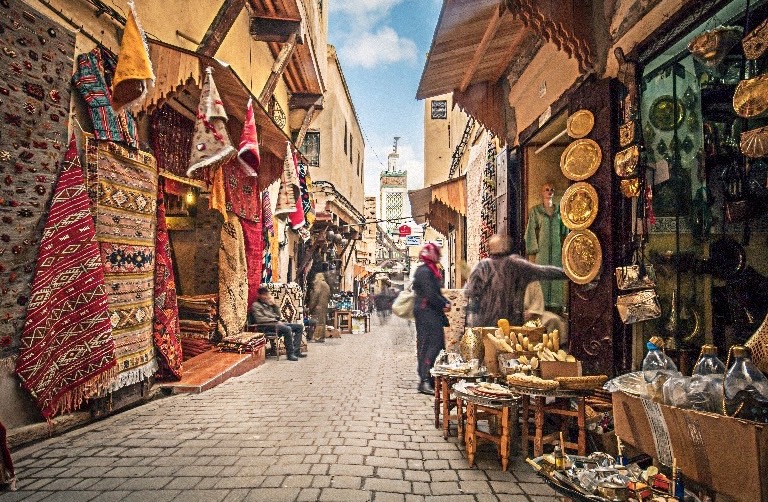How to Travel Safely in Countries With Oppressive Regimes
Lands under authoritarian rule hold a special kind of attraction for the adventurous traveler but visiting them does not come without risk.
 Photo © Getty Images/ED JONES/AFP
Photo © Getty Images/ED JONES/AFP
- What is an oppressive regime?
- Follow the rules
- Keep your opinions to yourself
- Take care online
- Fly under the radar
Ancient civilizations, intriguing cultural traditions, and customs that are entirely different to those of your own country – it’s little wonder intrepid travelers are drawn to the likes of North Korea, Iran, and China. But traveling to countries such as these takes more than courage and common sense.
Do your research and travel mindfully when venturing into oppressive nations and take their rules and restrictions seriously. There are usually limitations on what travelers can do when they visit, along with real consequences if they don’t follow regulations during their stay.
Keep in mind that some countries may also take such a staunch stance on an issue that traveling there simply isn’t safe. Several countries have criminalized same-sex relationships, for example, with those identifying as LGBTQ+ risking imprisonment or corporal punishment.
If you do decide to travel to an oppressive country, read on to minimize the chances of your adventure going horribly wrong.
What is an oppressive regime?
As of 2023, there were 28 countries on the list of oppressive regimes, according to UK-based not-for-profit Ethical Consumer. Countries make the list based on real data related to human rights, press freedom, labor conditions and corruption. The Political Terror Scale, for example, measures state-perpetrated violence, such as torture and extra-judicial killings; the SERF Index uses statistical analysis to test how efficiently a government supports people’s health, education, housing, and social welfare. The 28 countries on Ethical Consumer’s list of oppressive regimes are: Algeria, Bangladesh, Belarus, the Central African Republic, China, the Democratic Republic of the Congo, Egypt, Eritrea, Ethiopia, India, Iran, Iraq, Israel, Libya, Mali, Mexico, Myanmar, Nigeria, North Korea, Philippines, Russia, Saudi Arabia, Somalia, South Sudan, Sudan, Turkey, Uganda, and Venezuela.
Boycotting an oppressive regime is an option, of course, but doing so can punish the very people already suffering the most. As Intrepid Travel co-founder Geoff Manchester points out: “The reality is that when tourists stay away, it often impacts the wrong people. It’s not just the government or military who feels the pinch, it’s the locals who rely on travelers purchasing their goods to support their families.”
Follow the rules
Whether you agree with them or not, entering an oppressive country means adhering to their sometimes draconian rules. In North Korea, for example, independent travel is not allowed. Be prepared to travel with an approved tour group accompanied by government-appointed guides at all times. Don’t be tempted to stray from the group during excursions to do your own thing – it’s a no-no – and it’s best not to try to strike up a conversation with a local. Interaction with locals is discouraged and often limited to official settings. Be mindful of curfews that require you not to leave your accommodation after a certain time. As uncomfortable as these limitations to freedom are, it isn’t worth testing how strictly they are enforced.
In North Korea, showing respect for the national flag and political leaders is important – and can lead to disastrous consequences if you don’t. Who can forget the case of US college student Otto Warmbier, who was arrested in Pyongyang in 2016 while on an organized tour for allegedly trying to take a propaganda poster from the wall of his hotel? He was sentenced to 15 years hard labor but returned home to the US blind, deaf and deformed the following year, dying a few days later.
Keep your opinions to yourself
Voicing your opinions or engaging in political debate can label you as an activist in the eyes of officials. It isn’t just what you say out loud that can come under scrutiny. Be careful not to take books with you that could be considered religious or critical of the country’s regime (leaving them at home, not in your hotel room), and be mindful of the content stored on your phone, tablet or laptop – inspections can and do happen. Be mindful of what you say throughout your trip, even in the relative safety of your hotel. It’s best to assume that all your activities and conversations are being monitored.
Take care online
Social media isn’t a safe space to share your thoughts either and keep in mind that all of your online activities may be tracked. In China, its strict internet censorship and monitoring is known as the ‘Great Firewall’ of China. Social media platforms such as Meta, Instagram, X, and YouTube are blocked.
Use a Virtual Private Network (VPN) to access blocked content if you must but be aware that VPN usage can be monitored. Also check your past posts, reels and tweets for anything that might be considered offensive to the country you’re visiting. Even the US now requires visa applicants to disclose all social media handles they’ve used over the past five years on more than 20 different platforms.
Fly under the radar
Blend in as best you can to avoid drawing attention to yourself. Dress modestly if that’s what the locals do. In Iran, women are advised to wear loose-fitting, long-sleeved clothing and a headscarf (hijab) that covers their hair. Men should wear long pants.
If you’re traveling to a Muslim-majority country such as Saudi Arabia during Ramadan, a time of fasting, prayer and spiritual reflection, avoid eating and drinking in public during daylight hours. Also, avoid public displays of affection, ask permission before taking photos of people, places or things (anything from construction sites to train stations could be considered off-limits), and be respectful of gender segregation practices in public places. Restaurants, religious sites, public transportation and certain events may all require men and women to sit separately.
Related articles
Simple and flexible travel insurance
You can buy at home or while traveling, and claim online from anywhere in the world. With 150+ adventure activities covered and 24/7 emergency assistance.
Get a quote

8 Comments
Like the US?!?! We are the most oppressive fascist regime on the planet! Domestically and internationally and keep getting worse! Where is the cultural awareness and reflection in this article?
This article was misleading. It does not cover the "ethics" of traveling to an oppressive regime; it's more like tips for not getting in trouble there. I'd like to see an actual article about the ethics and a conversation, too. Thank you
Oh Come on, Kristen Dolle, that is probably, seriously, the most ridiculous comment I have ever read. The US the "most oppressive fascist regime"? Jesus, where to start. A useful barometer of oppression is the reaction of the authorities in the face of public criticism. Let me just propose this experiment: in the US, publicly criticize Donald Trump, and see what happens to you. Breaking news: NOTHING will happen to you. I publicly criticize Trump all the time and nothing happens. Then go to North Korea, China, Syria, just to name these three, and publicly criticize Kim Jong-Un, Xi Jinping or Bashar Al-Assad, and see how the government reacts. Enjoy your time in prison. Now just get real and think rationally about oppression. You're welcome.
I agree with ladyoflarkspur. The article was terribly disappointing because there was no mention of ethics. Information on personal safety in oppressive regimes is important, too. Just bill it as such.
To get a visa for entry into the USAyou now have to supply your Social Media account names, from the last five years across all platforms. Interesting...
I lived in Turkey for 3 years and what you wrote about it is simply NOT TRUE. Please educate yourself.
Well for me the best thing to do is to have a quick search about the country you plan to visit and follow the steps in acquiring <a href="https://visahelp.us.com/visitor-visas/">visitor visas</a>. With this you can learn the important points you must avoid doing while staying in the country.
The article was very useful for tips if you choose to travel to an oppressive country, but it does not address the ethics of whether you *should* travel to such a country. For example, Cuba and Myanmar are both high on my list of countries I want to visit, but is it ethical to do so? Myanmar has committed genocide against the Rohingya people, while Cuba is backing the dictator Maduro in Venezuela. I know that the everyday people in these countries do not necessarily agree with their governments, much like I do not agree with my own government this term, so do I go and invest my tourism dollars in the local people? Or does that still benefit the governments I disagree with? Another article addressing this topic would be helpful.